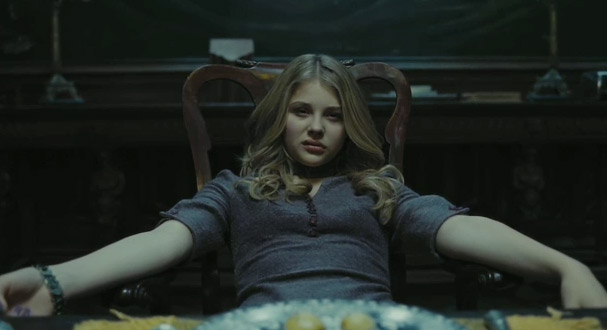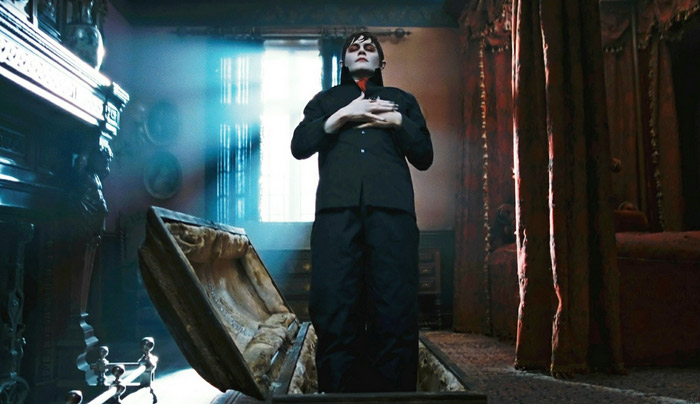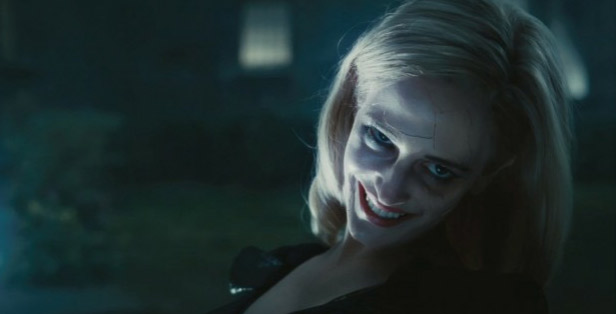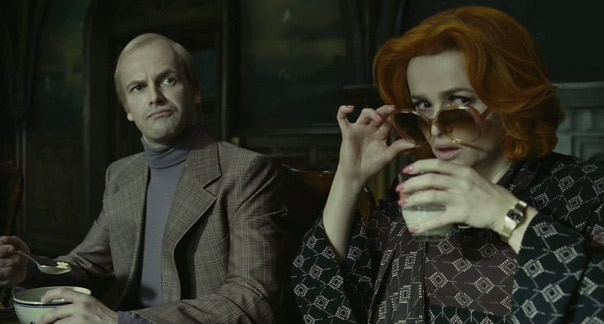This article was originally published at Towleroad in my weekly column
 Chloë Grace Moretz is judging you!
Chloë Grace Moretz is judging you!
With the world too busy seeing The Avengers (reviewed) for a second time last weekend, Dark Shadows premiered to considerably less fanfare and bank than Tim Burton and Johnny Depp collaborations are generally greeted with. So who will even notice that we're one week late to the ball? Young Carolyn Stoddard (Chloë Grace Moretz) will -- she's so smugly superior -- but she prefers the word "happening". She's quick to school her out-of-time vampire uncle Barnabas Collins (Johnny Depp) that no one throws "balls" anymore.
Actually, Carolyn, Tim Burton does...
His movies are less like parties or happenings these days and a lot more like balls: the guest list is expected (Johnny Depp and Helena Bonham Carter always RSVP); the attire is formal (Colleen Atwood gowns and suits preferred and always theme-specific); and the attendees will interact ritualistically in spacious well decorated halls (i.e. soundstages); and you don't arrive expecting a story but a festive visual and physical experience.
Tim Burton has never been great at "story" anyway and Dark Shadows is no exception. The plot is overly complicated and enormously repetitive, boiling down to this: the evil witch Angelique (Eva Green) and her ex-lover the vampire Barnabas Collins (Johnny Depp) have been at odds since the 1700s. Centuries later they still lust-hate each other and battle for the soul (and fishing profits) of the village known as Collinswood in the 1970s. As weird as it may be to say, "...in the 1970s" is the important part of that sentence. Burton hasn't cared much about storytelling since the 1990s when he made his two best films (Edward Scissorhands and Ed Wood). As a director he's always relied on his own peculiar aesthetic as the movie. His gothic cutesiness has grown so successful it's now a calcified brand which he can transport with ease (and a hundred million plus budget) to just about any property for a Burtonesque remake.
 This Nosferatu gag actually has a decent punchline
This Nosferatu gag actually has a decent punchline
So the real question with each new movie is whether he's throwing a good ball or "happening". The answer changes from scene to scene.
Burton can still deliver a great visual hook as he does here with a recurring ghostly reenactment of a woman's hypnotic "suicide". These visitations are beautiful and haunting but the film's climax would play far more impactfully if we had pieced the details together for ourselves and felt the tragedy with an engaging "a ha". He can also still deliver whimsical comedy as in one fine bit when Barnabas' self-pitying dramatics actually cause the scene's chintzy musical accompaniment.
But even in the film's best moments there's a certain clumsiness in the play and inertia in the pacing as if Burton is caught between his new laziness and his old genuine excitement about his chosen material. Is it a comedy, a tragedy, a melodrama, or a horror film? Burton doesn't know so the actors try to hit all the targets with entertaining but mixed results. Helena Bonham-Carter and Johnny Depp "get" Tim Burton (as well they should) but their elaborate characterizations feel more effortful and less funny than the movie needs. Even the gloriously welcome Michelle Pfeiffer (come back to the movies full time anytime, diva), moves with a certain careful stiffness through her regal, funny and winning big screen return as the Collins matriarch. Chloe Moretz fares worst with the one note role of the sullen teenager. Two years into her ubiquitous teen stardom she's still burdened by her youth, all pose and no deeper feeling. That's fatal in a Burton film where deeper feeling is the only thing that will differentiate you from the elaborate human statuary just out of focus behind you.
 Smiling through the pain. She knows she's "Best in Show"
Smiling through the pain. She knows she's "Best in Show"
Only Eva Green, who also played a witch in The Golden Compass, moves through the gorgeously gothic set and preening 70s affectations with the freeness of inspiration. She's all quick spins, rump slides, and bosomy pride as unwaveringly sure that she owns the movie as Angelique is that she owns the town. Her freakish rictus grin is the perfect cap on the star turn: comedy, tragedy, melodrama and horror all at once. Green also earns the movie's best and most inventive visual effect, her skin-deep beauty cracking like the shell of a hard boiled egg…without the egg inside. She's never been human enough.
In the end Dark Shadows doesn't cast any of its own. Its mild successes and failures shine no bright light on the director's future (even though the final image is all "Can I be your sequel, please?") If Burton continues to make movies as terrible as Planet of the Apes and Eyesore in Wonderland, Dark Shadows will be a minor uptick in his creative downslide. If his imagination finds a second wind or purpose, Dark Shadows might well be remembered warmly as a turning point… the moment he stumbled back toward the light.
 "Is he for real?"
"Is he for real?"
Grade: C
Oscar Chances: Given the tepid box office (as these things go) it doesn't seem likely though Art Direction and Costume Design can't ever be dismissed fully come Oscar time with Burton features. Rich Heinrichs and Colleen Atwood are formidable gold-seekers.